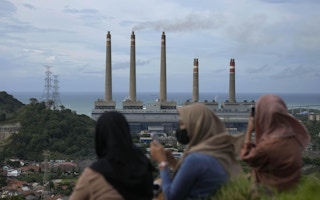This year, Indonesia will elect a new president.
To continue reading, subscribe to Eco‑Business.
There's something for everyone. We offer a range of subscription plans.
- Access our stories and receive our Insights Weekly newsletter with the free EB Member plan.
- Unlock unlimited access to our content and archive with EB Circle.
- Publish your content with EB Premium.
One of the new president’s most important duties is to carry the torch for the energy transition in a country that is highly dependent on fossil energy, and is also the world’s biggest exporter of coal.
So a big question voters will be asking in the run-up to polling day on 14 February is: what is the energy roadmap that the next president should set?
To get a grasp of the road map of Indonesia’s new president, we need to understand the legacy left by the current president, Joko Widodo, widely known as Jokowi, who came to power a decade ago.
One of Jokowi’s flagship maneuvers to drive the energy transition has been the Just Energy Transition Partnership (JETP), a scheme to retire Indonesian coal plants and curb the climate impact of the energy sector, funded by wealthy countries.
Jokowi is known to be particularly proud of JETP, which was launched at the G20 Summit in Bali in 2022. At the APEC Economic Leaders’ Informal Dialogue and Working Lunch event, held in the United States last November, the president said JETP model could be deployed in other developing countries.
But questions hang over the credibility of the JETP funding scheme as the cornerstone of Indonesia’s energy transition. The Comprehensive Investment and Policy Plan document, or CIPP, which lays out the details of JETP and how it fits with Indonesia’s plan to achieve net-zero by 2060, exposes weakness in Indonesia’s energy diplomacy.
The document states that the composition of grant funds is only US$0.3 billion out of total funding of US$21.5 billion. This effectively means that more than 95 per cent of JETP’s funding comes in the form of foreign debt traps.
In the CIPP document, there is no story about Indonesia’s role in reducing greenhouse gases through the energy transition. Instead, what can clearly be seen are rich countries – the world’s largest historical climate polluters – setting debt traps in Indonesia’s energy transition.
The lack of climate justice in the CIPP JETP document is also visible in the funding structure for renewable energy. JETP’s funding orientation only aims to develop large-scale renewable energy. It ignores community-based renewable energy.
Community-based renewable energy can give poor people, especially those in remote areas, access to electricity in a country where thousands of people still live without electricity.
Lower-income people living in remote areas have the same right to development as wealthier people in urban areas. The right to energy is very much part of the right to development – and the government has an obligation to fulfill this right.
Ironically, Jokowi, who came to power on the back of bold promises to serve the poor, does a disserve to climate justice with JETP. The scheme is President Jokowi’s bad energy transition legacy. It will burden taxpayers and marginalise the poor.
The carbon capture delusion
Another unfortunate chapter in President Jokowi’s energy transition legacy is his preoccupation with Carbon Capture and Storage (CCS) technology.
Last November, several mainstream media outlets reported that President Jokowi had met the boss of a multi-national oil and gas company from the United States. During the meeting they discussed cooperation plans for decarbonisation through the construction of “green” petrochemical refineries and CCS.
CCS is a technology that is claimed to be able to capture greenhouse gas emissions from power plants before they enter the atmosphere. But CCS is a false solution, as its use serves to prolong the use of fossil energy.
In fact, CCS produces emissions as the carbon capture process is highly energy intensive. The Intergovernmental Panel on Climate Change (IPCC) report has argued that the ability of CCS to deliver meaningful emissions reductions over the next decade is low, while the costs will be high.
With such high costs, investment should be directed directly towards developing renewable energy in Indonesia instead.
President Jokowi’s troubled energy transition legacy must not continue. Indonesia’s new president needs to redesign the energy road map. For example, if JETP is to continue, it must be renegotiated and implemented in a way that benefits people without access to electricity and protects coal sector workers who could find themselves without jobs.
In other words, it should be genuinely just.
Indonesia’s new president needs to renegotiate the debt composition of the JETP scheme. As it stands, it is clearly unfair.
The new Indonesian President must also change the way he formulates energy policy. To date, the Jokowi regime has not seriously involved the public in formulating energy policy, including the JETP deal. Energy policies are carried out behind closed doors. The Indonesian people deserve more say in how their energy system develops.
The CCS investment plan also needs to change, as the use of CCS will only sustain the burning of fossil energy, prevent the entry of renewables into the market and put the energy transition into reverse.
The new President of Indonesia needs the courage to turn their back on Jokowi’s bad energy transition legacy and take a bolder path forward towards clean energy that leaves no one behind.
Firdaus Cahyadi is Indonesia team lead for environmental non-profit 350.org











